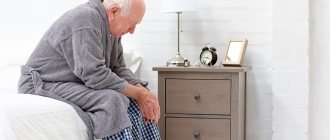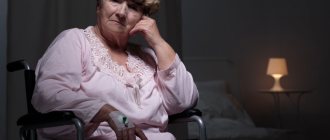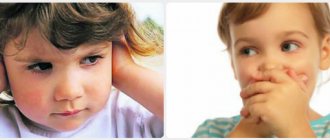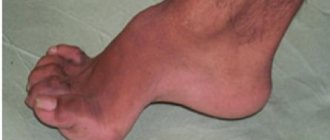- home
- Helpful information
- Elderly care
- Sleep disorders in older people
35% of older people have problems sleeping. The older you are, the more often such disorders occur. These may include difficulty falling asleep, waking up early, or interrupted or shallow sleep. A person may be disturbed by vivid, unpleasant dreams, he may experience fear of the night or dreams, and may not feel rested in the morning. Problems gradually accumulate: anxiety and tension increase, which makes it more difficult to fall asleep, and the period of night rest lasts less. To normalize the regime, you need to determine the reasons why it was violated.
Sign up for a consultation
Why do sleep problems occur?
There are two categories of violations.
Primary. Most often this is sleep apnea, which is manifested by short breath holds. Because of them, a person wakes up and then cannot fall asleep. The older you are, the more often such disorders occur. Their risk is higher in overweight people who are prone to snoring for a long time. In other cases, myoclonus (convulsions, muscle twitching), restless leg syndrome (trembling) interferes with sleep.
Secondary. They arise due to neurological, mental disorders, and some somatic diseases. These could be heart problems (frequent attacks of angina at night), bronchial asthma or COPD, pain syndromes, endocrine pathologies. If sleep disorders are associated with physical well-being, the person sleeps superficially, often wakes up, but can then fall asleep. With neurological problems, difficulties may arise both in falling asleep and in maintaining sleep. In two thirds of cases, secondary disorders are associated with mental disorders: depression, neuroses, dementia, high levels of anxiety, etc.
More often than not, sleep problems have several causes. For older patients, this may include an iatrogenic factor—taking medications that cause insomnia. Among these drugs are antidepressants, nootropics, antiarrhythmics, antihypertensives, bronchodilators, etc. Insomnia can be caused by their overdose or side effects.
The task of a gerontologist, psychiatrist or therapist when working with an elderly person is to collect as much information as possible about how insomnia manifests itself and what features it has in a particular case.
It is important to determine its root cause. In diagnosis, it matters what time a person falls asleep, whether he wakes up at night, how long he sleeps continuously, what his dreams are like, and how he himself assesses sleep productivity. The nature of the disorders and their possible causes allow us to select the most effective method of therapy. You have questions?
We will call you back within 30 seconds
or call the number
Clicking the "Submit"
, you automatically consent to the processing of your personal data and accept the terms of the User Agreement.
Preventive measures
Insomnia can be a disorder on its own, but it is often a symptom of another disease or condition. Half of those who have experienced this disorder blame stress and anxiety for the problem. In the case of a problem caused by stress, the degree of sleep disturbance depends on the severity and duration of the stressful situation.
Sometimes this may be a distressing event such as the loss of a loved one, job loss and retirement, a breakdown in a marriage or relationship, or a tragic accident. Anticipation of events such as an upcoming trip or holidays can also disrupt and make sleep difficult. Insomnia can occur when jet lag or other major schedule changes occur. Its frequency increases with age, but most often the problem is associated with some other disease.
In the situation with older people, the problem of insomnia is chronic. This manifestation is typical for most people over 60-65 years of age. Therefore, you should accept these changes as a fact and try to adjust them as much as possible in order to make your life and the life of your loved ones as comfortable and harmonious as possible. And remember that the best remedy for insomnia for the elderly
- this is your support and understanding.
Non-drug treatment of insomnia in older people
At the first stage, they try to correct sleep disorders without using sleeping pills. To do this, older people are advised to:
- go to bed and get up in the morning at the same time, adhere to a strict regime. Going to bed should begin only after drowsiness appears;
- If you can’t fall asleep within 15-20 minutes, you can’t stay in bed: it’s better to get up, move to a chair or another room until you want to sleep again. If possible, the bed should be associated with sleep, and not with insomnia;
- You shouldn't sleep during the day. If severe drowsiness occurs, the recommended rest time is no more than 30 minutes;
- in the evening it is better to refrain from rich, high-calorie food, too strong impressions, and drinking tonic drinks;
- Sleep hygiene is important. The bed linen should be fresh, the mattress and pillow should be comfortable. It's better if the bedroom is cool. Curtains - thick, not letting in light;
- spend the evening hours quietly, doing the same activities. You can use daily “rituals” to relax: take a shower, read before falling asleep, drink a glass of milk, etc.;
- increase physical activity in the morning. Muscle fatigue improves the quality of rest at night. After lunch or in the late afternoon, you can go for a long walk;
- after lunch, exclude drinks and foods containing caffeine or other tonics (tea, coffee, chocolate, sweets, cocoa, etc.);
- stop drinking alcohol. Alcohol does not replace sleeping pills: “drunken” sleep is superficial and does not provide complete rest.
Relaxing baths
An evening bath is also an effective remedy for overcoming insomnia. However, many make a mistake that negates its positive effect - they make the water hot, although it should not exceed +36°. The optimal completion of the procedure will be a contrast shower, which improves the tone of the body. The following is added to such baths:
- pine decoction: add a glass of pine needles to 3 liters of water; a few spruce or pine cones are not forbidden. Boil for 10–15 minutes, let steep for at least 2 hours. The duration of the procedure is 20–30 minutes;
- Linden blossom is also a suitable choice. 2 cups of inflorescences, poured 2 liters of boiling water, leave for 3 hours. A relaxing bath can last up to half an hour;
- Boil 100 g of valerian root for 15 minutes in 1 liter of water. Or you can simply add 20 to 35 drops of ready-made valerian tincture to the bath.
Folk remedies act gently and gently on the body, so the effect usually does not appear instantly. But relief will definitely come and last for a long time. Getting rid of insomnia is quite possible.
Insomnia medications for older people
Medicines are used only if compliance with general recommendations, correction of diet and nutrition do not produce results. Sleeping pills are used with extreme caution:
- only with diagnosed insomnia (sleep disturbances recur for a long time and negatively affect the patient’s physical and mental state);
- the minimum effective dosage is prescribed;
- therapy is intermittent. Taking the drug is allowed 2-3 times a week (not daily). Courses of treatment are short, do not exceed 3-4 weeks;
- monitoring the condition while taking the drug, gradually reducing the dosage immediately after receiving the result.
If sleep disturbances are secondary, caused by some underlying disease, therapy is aimed primarily at treating it. For primary disorders, medications are prescribed taking into account exactly what problem is causing insomnia. For muscle spasms, tranquilizers can be effective; for apnea, cyclopyrrolones are more often used.
When prescribing any psychoactive, sedative and other drugs to elderly patients, the dosage is reduced as much as possible, taking into account age and health status. You cannot independently increase the dosage or duration of the course - this is dangerous for the development of drug dependence and a negative impact on cognitive functions. With long-term continuous use of certain sleeping pills, concentration, attention, and thinking may decrease.
Folk remedies
These are significantly safer ways to treat insomnia from all angles. One of the best options is honey.
The following recipes should be recommended:
- a tablespoon of honey and a spoon of Borjomi, finely chop the lemon, mix, take in the morning before breakfast;
- two spoons of honey and walnuts, a little lemon juice, mix everything again, but drink at night;
- if it’s difficult or you just don’t like it, dissolve one spoon of honey in 200 milligrams of warm water and let the elderly person drink it at night.
There are other folk methods:
- sometimes insomnia occurs due to blood rushing to the head - it makes sense to try applying a little grated horseradish to it;
- mix honey with apple cider vinegar - a teaspoon at a time, a double dose is acceptable;
- mix thirty grams of motherwort and peppermint, twenty grams of valerian roots and hops. Take ten grams of the resulting mixture, pour boiling water and heat for fifteen minutes, cool, strain, add boiled water. When drinking an infusion of one hundred milliliters day and night, the sleep disturbance will most likely end quite quickly;
- mix valerian roots, three-leaf watch and peppermint, pour one tablespoon with boiling water, leave for half an hour, drink half a glass three times a day;
- mix in mint, motherwort, mistletoe, valerian roots, hawthorn flowers. Pour hot water, leave for half an hour, drink one hundred milliliters before bed and the next morning;
- take two tablespoons of blood-red hawthorn, pour 300 milliliters of boiling water, consume three times a day thirty minutes before meals;
- boil a tablespoon of crushed blood-red elderberry roots in 200 milliliters of boiling water, cook for fifteen minutes, remove from heat, keep for half an hour, take a tablespoon periodically;
- pour two hundred milliliters of water into one tablespoon of valerian roots, crushed in advance, leave to stand for eight hours, then you need to strain the infusion, drink one tablespoon at a time - before bed, after sleep, in the middle of the day.
These are not all recipes, but among the ones given above there will probably be something suitable.
Sleep disorders and dementia
In senile dementia and other delirious disorders, severe insomnia develops. Elderly people themselves do not complain about it, but for nearby relatives such sleep disturbances become a serious problem. A person does not fall asleep himself, does not allow others to sleep, his sleep and wakefulness patterns change. Therapy in this case requires a special approach.
In dementia, problems with sleep manifest themselves as a violation of the daily routine: during the day a person experiences drowsiness, and closer to night anxiety and agitation increase. The patient may try to leave home, collect things, tie knots, experience hallucinations, etc. It is dangerous to use tranquilizers in this condition: they can worsen health and make the patient even more restless.
It is possible to use antipsychotics and correct previously prescribed drug therapy. Medical doctors recommend changing your regimen so that the bulk of your activity occurs during the daytime hours. This will help restore the circadian rhythm, control it, and reduce the frequency of insomnia episodes.
Order a visit from a gerontologist. Experienced doctors. Treatment in a hospital or at home. 24-hour service in Moscow and the region. Professional, anonymous, safe.
- Caring for the elderly with mental disorders
- Psychiatrist help at home
- Types of rehabilitation for the elderly and disabled
- Advantages of our hospital
- How to choose a good nursing home
- Care for the elderly: in a hospital or at home
- Problems of caring for the elderly
- Who should you leave a person with dementia with if you need to leave?
- Help from a gerontologist in caring for an elderly person
- Sleep disorders in older people
- Features of caring for a bedridden patient
- Features of caring for older people with mental disorders
- Hygiene in old age
- Establishing guardianship for a patient with dementia
- Rules for communicating with an elderly person
- 10 Frequently Asked Questions About Nursing Homes: Everything You Need to Know
Clinical picture
Senile insomnia is accompanied not only by a reduction in sleep duration, but its structure also undergoes certain changes. The stage of deep slow sleep decreases, and the duration of superficial sleep, on the contrary, increases. Frequent awakenings and increased physical activity are noted (the person constantly tosses and turns, cannot get comfortable in bed, wrinkles the blanket, pillow, etc.).
Depending on the characteristics of sleep disturbances, several forms of insomnia in older people are distinguished. This:
- presomnia, accompanied by difficult, prolonged falling asleep;
- intrasomnic, which is characterized by frequent awakenings;
- post-somnia, characterized by a feeling of discomfort, weakness, weakness and malaise after waking up, and a general decrease in performance.
Approximately a third of elderly patients experience a combination of all three types of insomnia.










